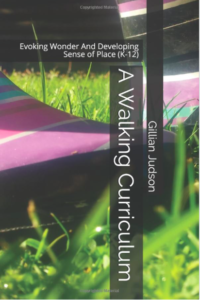30 Days of Outdoor Learning: Starting September 16, 2019
We were excited to host a 30-day Walking Curriculum challenge that started on September 16, 2019! Educators around the globe (preK through high school) took part in learning outside for part of the day–rain or snow or shine–for 30 days. Through this initiative student got outside for learning across Canada and the USA, in Mexico, Spain, England and Australia to name a few places. The best part? Many educators are still doing it!
With The Walking Curriculum: Evoking Wonder And Developing A Sense of Place as a resource and guide for outdoor learning educators can engage students in imagination- and inquiry-focused walks designed to enrich their understanding of the regular curriculum. Outdoor, walking-based learning fuels cross-curricular activities that students pursue throughout the rest of their day.
This page offers you support for moving your teaching outdoors! You will find free resources, information for parents, tips for successful school wide involvement and more. Be sure to check out the new resources we’ve added since our last 30-day challenge. Join the movement to #getoutside!
What is the Walking Curriculum?
Playgrounds and schoolyards are underused resources for ecological learning.
 The Walking Curriculum is one example of an approach to teaching called Imaginative Ecological Education. This is a Place-based approach to education that affords learners opportunities to learn with/in the natural and cultural contexts where they go to school. What sets Walking Curriculum and other IEE activities apart are the use of tools (cognitive tools) that actively engage emotion and imagination in learning. Basic premise: imagination fuels meaning-making.
The Walking Curriculum is one example of an approach to teaching called Imaginative Ecological Education. This is a Place-based approach to education that affords learners opportunities to learn with/in the natural and cultural contexts where they go to school. What sets Walking Curriculum and other IEE activities apart are the use of tools (cognitive tools) that actively engage emotion and imagination in learning. Basic premise: imagination fuels meaning-making.
Learn more: Walking Curriculum/IEE initiatives are currently being developed/led by Dr. Gillian Judson, Executive Director of the Centre for Imagination, Research and Culture at Simon Fraser University.
Why walk? Why take learning outside?
“The simple act of taking a walk—a walk with a curricular focus or purpose—can have multiple positive consequences. For example, walking can support students’ health and wellbeing. It can also emotionally and imaginatively engage learners by changing the “context” of learning. On a deeper level, a new level of curriculum relevance can emerge for students when learning occurs in real-world contexts. Going even deeper, walking-based practice can support students in developing a sense of Place. … Sense of Place is what can change how our students understand the world of which they are part—it can help them re-imagine their relationship with the natural and cultural communities they live in.”
~Gillian Judson, A Walking Curriculum (2018)
NEW Resource: The Deep Time Walk
Experience 4.6bn years of time as you walk 4.6 km.
Designed by an experienced team of radio producers, professional actors, award-winning script writers and sprinkled with creative genius, the Deep Time Walk brings together excellence in science, the arts and appropriate technology to provide a unique experience of Earth history.
Get a gift economy app for the Deep Time Walk here and try it with your students. Learn even more by reading this post from imaginED.
More Resources to Support You
Click here to download an information letter for parents.
Try out these FREE teaching activities for K-12 from the Imaginative Ecological Education website. Of course, there are many different activities you can try with your students outside. Key: Engage their imaginations in learning and strive to create cross-curricular connections!
Tips for Success: Schoolwide Participation
Want to expand the impact of the 30-day Walking Curriculum Challenge within your school? Here are some tips to help make a schoolwide difference:
- Send an information letter home to parents (You can download the one in the resources section below);
- Ask your school leaders to introduce the 30-day Walking Curriculum Challenge at a staff meeting;
- Include messages about the 30-day challenge during the morning announcements–what’s the weather like today for our learning outside?;
- Organize “Buddy Classes” for outdoor learning. (Teaming a Grade 7 class with a Kindergarten class can be really effective in facilitating a sense of community.);
- Describe the 30-day Walking Curriculum Challenge in the school newsletter;
- Organize lunch n’ learn sharing sessions during the 30 days to create a support system between other teachers who are participating.
Share!
We want to see what you and your students do during the 30-day challenge! Spread the word and help motivate others to #getoutside by posting pictures of all the ways your students learn outdoors. Share images of your activities, messages about your insights or ideas, and also images of resources you notice help stimulate your students’ wonder and curiosity for learning outside.
Tag us on instagram @centre_for_imagination and on Twitter @CIRCE_SFU/@perfinker. Let’s follow each other by using the following hashtags: #walkingcurriculum #getoutside
Share the graphics below with your social media networks! Invite colleagues to #getoutside with the #walkingcurriculum for 30 days. (Drag/drop these images to your device.)
Prizes!
Walking curriculum challengers M. Foley and L. Larmande won a set of Deep Time Walk Cards from deeptimewalk.org
The set contains 58 beautifully illustrated cards, giving 4.6 billion years of Earth history in a tactile, easy to use format. Each card provides a 100-million-year summary of the key transitions that have occurred across Earth’s deep history, with associated reference data and inspiring quotes.
Winners also received a set of 15 Deep Time Line bookmarks. Each one gives a graphical overview of the major revolutions that have occurred across Earth’s 4.6-billion-year history, providing a useful summary of the geological events and evolutionary leaps that have led to life on Earth today.
Maple Organics is Canada’s first organic pharmaceutical company manufacturing and selling organic body care, baby care, pharmaceutical and hair care products with a very unique ingredient, Kokum Butter (derived from a Mangosteen plant). All Maple Organic products are made to Health Canada standards and are certified organic to support sustainable farming practices.
Walking Curriculum challenger S. Schnare from Surrey won a Family Immunity Kit (value $100) from Maple Organics. It contains best selling organic Skin Therapy, organic Cold + Flu Vapor Balm and all natural, safe to use Bug Spray. Perfect for year-round outdoor walks!
